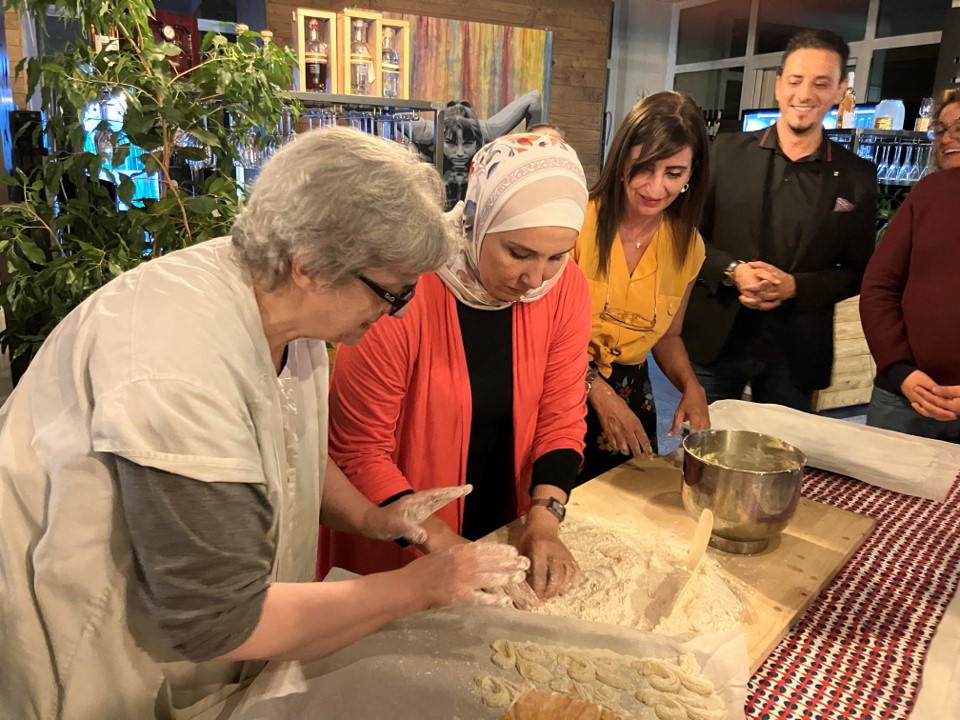Italian insights for stronger links between agricultural producers and tourism in Jordan

On a five-day tour from 18-24 October, twelve Jordanian delegates travelled to different Italian regions to explore how to best connect local agricultural production to tourism. The tour was part of an EBRD/FAO project to promote rural development and diversify farmers’ incomes in Jordan.
Adding tourism to farmers’ incomes
Agriculture in Jordan is the main source of income for 15 percent of the population in rural areas that are commonly arid. Growing demand for ecotourism and authentic gastronomic experiences presents an opportunity for farmers to diversify their incomes and enhance the country’s tourism appeal.
A study tour to explore this opportunity further was organized as part of a rural development project led by FAO, and the EBRD through the funding of the European Union’s Trade and Competitiveness Programme and the Southern and Eastern Mediterranean Multi-Donor Account (MDA)*.
“Rural development through agritourism in Jordan can be very interesting for farmers as it brings them a new stream of income,” said Mr Mesbah Altarawneh, Agriculture Director of Al-Karak Governorate. “We see many similarities between Italy and Jordan in terms of historical, cultural, and culinary heritage. The tour has provided good insights on how to prioritize investments at home, to build capacities and infrastructures, and to create the supportive regulatory framework that we need.”
The Italian agritourism experience
Italy has more than 25,000 agritourism offerings – a number that is increasing year on year. Besides acting as an additional income stream, agritourism provides entrepreneurship opportunities for many young people and women, with more than a third of all Italian agritourism businesses run by women. It is also the only country in the European Union with specific laws regulating agritourism and making it an agricultural activity.
“Each region in Italy is known for its unique cuisine and cultural attractions, as is also the case in Jordan,” said Eng. Ayman Abukharoub, Assistant of the Secretary-General, Ministry of Tourism. “We have seen the many ways in which Italy is successfully attracting visitors in search of authentic and diverse food and farming experiences. All this did not happen overnight though. It took many years of investment, capacity building and legislative adaptations. If we are to adopt this model, we need a comprehensive national and regional rural development plan that integrates agritourism into our broader ecotourism strategy.”
From Rome to the heel of Italy’s boot
The Jordan delegation who participated in the study tour included decision-makers from government institutions, non-government organisation, producers’ association as well as agritourism service providers. ‘We believe this exchange of experience between Italian and Jordanian agritourism stakeholders will pave the way for shaping the roadmap for development of the sectors, which will create stronger linkages between Jordan’s touristic heritage and its agricultural richness’, said Iride Ceccacci, Associate Director, Head of Agribusiness Advisory at the EBRD. In Rome, the participants met with the Chamber of Commerce to discuss the strategies that Italy has deployed to encourage tourists to extend their stay and participate in outdoor recreational activities at farm. In Tivoli, they also met with the Archeomarket Community, a Slow Food community in charge of the organization of a food market that promotes the local gastronomy and rich archeologic heritage of the area. They learned about the importance of creating a narrative that ties different food products such as olive oil and ancient wheat varieties to their cultural heritage. The tour then headed towards Puglia stopping off on the way to visit agritourism enterprises, including an iconic farmhouse for a participative cooking experience as well as traditional bakeries, and olive oil producers.
“The strength of the Italian agritourism model is the farms’ multifunctionality and innovation capacity to propose activities and services for tourists to enjoy unique experiences in an agricultural context. This could not be possible without passionate farmers sharing their traditions and stories” explains Arianna Carita, economist at FAO Investment Centre.
The group had the opportunity to talk with professionals from the hotel, restaurant and catering sector, chefs, and representatives from agricultural cooperatives and academia to better understand the challenges that farmers face if they want to diversify their activities into agritourism, for example, compliance with food safety regulations. They also discussed the need to put in place supportive laws and regulations to protect farmland and natural spaces.
Next steps
Inspired by the Italian experience, the delegates have decided to create a task force to take the Jordanian agritourism sector to the next level. It will include the Ministry of Tourism and Antiquities, the Ministry of Agriculture, and the Ministry of Planning.
“The main lesson that we will take home is that our institutions need to work together to develop a more solid regulatory system to enable agritourism entrepreneurship,” concluded Osama Hassan, Head of Eco-tourism Development at the Royal Society of Conservation of Nature.
*The EBRD manages the SEMED MDA’s donor funds. The contributors are Australia, Finland, France, Germany, Italy, the Netherlands, Norway, Sweden, Taipei China and the United Kingdom.
